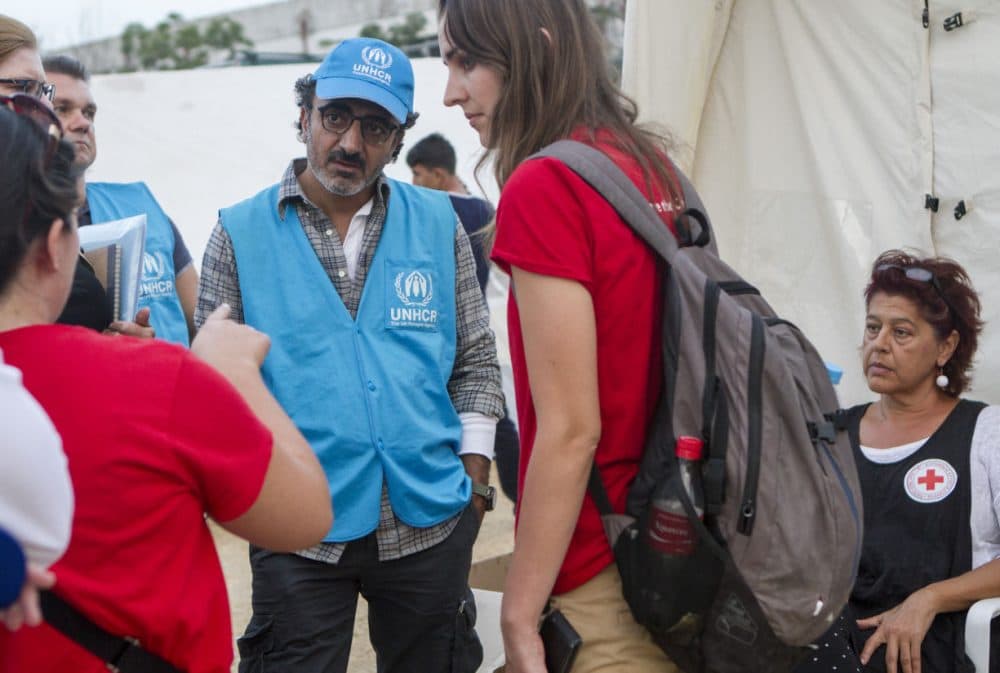Advertisement
Chobani CEO Pledges Help To Refugees In Europe
Resume
Turkey-born Chobani yogurt company CEO Hamdi Ulukaya recently visited the Greek island of Lesbos, to see for himself the plight of the tens of thousands of mainly Syrian refugees who are flooding into Europe through Turkey.
He tells Here & Now's Peter O'Dowd that he saw desperate conditions there: "You would assume there would be tents, there will be housing, there will be food, a cup of soup at least ... none of that."
So he's set up a new foundation, called Tent, to help. And he wants other CEOs to join him in hiring refugees, something he's done for years at his production plants.
Interview Highlights: Hamdi Ulukaya
Was the island of Lesbos as bad as you thought it would be?
"It was worse than I thought it would be, simply because I thought it's Greece, it's Europe. [The refugees] left the troubled areas and they finally made it to this island and [they thought] the condition would be better. I mean I'm not talking about emotional condition, but at least the humanitarian, you know, needs, on the ground I thought would be much, much better, but I was very disappointed."
What did you see in Lesbos?
"You know, here it is. This is an island closest to Turkey. When they make it there, they're horrified, because most of them – it's a living or dying journey. When they get there, you would assume there will be tents, there will be housing, there will be food, there will be a cup of soup at least. None of that. There are some humanitarian workers on the ground trying their best, but of course, they're very limited what they can do. So it could be a week, it could be two days, it could be in a month sometimes, what we heard, they're just left alone. That's how it is."
Is the refugee crisis personal to you?
"It is. You know, I'm Kurdish. You know, I know this issue really well. And you know, these are the people I know; these are the people familiar to me; these are the people their faces are very, very familiar to me. And as a human being, anyone who lives anywhere in the world, when you see it – you know, sometimes reading in the news, you might not get a real picture, but when you see them, when you talk to them, you know, it's just heartbreaking."
"I'm Kurdish. You know, I know this issue really well. And you know, these are the people I know; these are the people familiar to me; these are the people their faces are very, very familiar to me."
On putting forth his personal wealth toward the refugee crisis
"I come from a very simple family ... I lived in a place where money didn't mean anything. Really. You just didn't have stores to go buy anything, you know, it was just a piece of paper. So throughout my life, I needed reason to do what I wanted to do. ..."
"I wanted to make sure the rest of my life is – while I’m doing what I’m doing – is go into the right places and make the world a better place and humanity a better place. So this issue, when I got in touch this year, that I found out is biggest humanitarian issue ever out there since World War II, and it's all in hands of governments and the U.N., and people like us, ordinary people like us, and your listeners. We don't know how big this is. So I immediately made the decision that this is the cause that I would like to get involved, and this is the cause that I would like to spend what I have, and this is what I’m going to do going forward."
On employing refugees at Chobani
"The second year I started my factory in upstate New York, you know, all the locals and farmers and people in the community would start working. And we kept hiring as Chobani started growing. And I've heard that Utica, which I used to live [in] at that time – town of Utica, beautiful town and filled with immigrants from all over the world. So I heard that there was a refugee center that people come from, again, all over the world, that they're having a hard time finding a job."
"So I went there myself and I said, ‘What if we employ them in our plant?’ ... Usually, they try to go to the businesses, knock on doors to see if they can employ them. She said ‘Do you realize that there is a barrier of language here?’ I said ‘I do, and similar to me.’ When I came to this country, I didn't know a word of English. I said, ‘We can get by. We can hire some translators.’ And then the second barrier was ‘Do you realize that most of them don’t have drivers’ licenses yet? They can’t drive.’ I said, ‘Well, we can get some public transportations to get them.’ So we proactively worked on it."
On refugees coming from different skilled backgrounds to the factory
"Imagine if someone who left from the place where they were comfortable – they've gone through so much emotions, physically and psychologically. And they survived. They made it to a new place. When you are in this mindset, when you went through this whole thing, you are the most productive person you will be. Nothing will scare you anymore. So let's look at the refugees in a way – not something that burdens the society, but it's an opportunity for the society."
Guest
- Hamdi Ulukaya, founder, CEO and chairman of Chobani. He tweets @hamdiulukaya.
This segment aired on September 23, 2015.